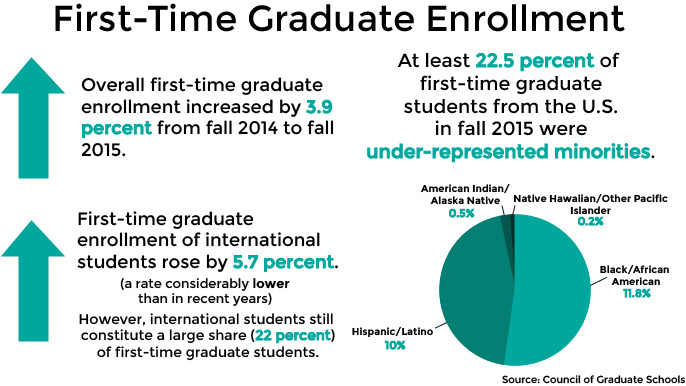
Between fall 2014 and fall 2015, U.S. graduate schools saw a 3.9 percent increase of first-time graduate student enrollments, the biggest increase in five years, according to a Council of Graduate Schools report released Friday.
The report, conducted by the council and the Graduate Record Examinations Board, was based on data from 617 colleges and universities across the nation.
“We are very encouraged to see [the increase] as an indication that people were seeing graduate education, masters and doctorate education as something that is valuable,” said Hironao Okahana, the lead researcher on the report.
While researchers are not sure why more students became interested in pursuing a higher degree, Okahana said one factor is the potential relation between education degrees and salaries.
“From what we know, the jobs that require a master’s degree or a doctor’s or professional degree at the entry-level are expected to grow faster than other types of jobs,” Okahana said.
Yassi Youdai, a sophomore in the College of General Studies, said she is not surprised to see more people decided to attend graduate school.
“I’m still undecided, but I’ve definitely thought about graduate school,” Youdai said. “Whatever major you choose to pursue, going to grad school, [then] you’ll get a better idea of whatever you want to do.”
May Alsaleh, a sophomore in the College of Engineering, said she sees a graduate degree as a good supplement to undergraduate education.
“I’m more likely to get a better job if I were to go to graduate school,” Alsaleh said. “For now I’m in mechanical, but my original plans were to do civil and environmental engineering. So if I can’t do that in my undergrad, if for any reason I can’t transfer, then I would want to have my master program be in energy technology.”
Another finding of the report is that women seem to be more interested in getting a higher degree — approximately 58.4 percent of masters students and 51.8 percent of doctorate students were women.
Okahana said he is also glad to see more minority students getting graduate degrees or doctorate degrees, though these students are still underrepresented in higher education.
Boston University spokesman Colin Riley said the university is committed to helping students who face additional adversity when applying to graduate school.
“The fact that that report shows that [those numbers are] increasing is probably a very positive sign that they’re going in the right direction,” Riley said. “People who are involved in the recruitment and retention aspects of the Office of Enrollment [and Student Affairs] and the Yawkey Center for Student Services certainly understand those factors and work hard to address and to reduce the things that are obstacles.”
Riley said the success of the U.S. economy could also lead to the increase in graduate school enrollment.
“When the economy is struggling more, there tend to be an increase in people who want to go back to school and get increased degrees,” Riley said.
Nour Al Kudsi, a senior in the College of Communication and the College of Arts and Sciences, said she has considered getting a graduate degree, but there is value in having work experience first.
“It seems to be really difficult to get a job without getting a master’s degree, but at the same time, it’s tough to get into grad school without decent work experience,” Al Kudsi said. “So it’s a bit of a double-edged sword.”




